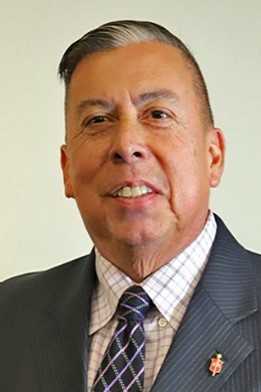Bridging the Past and Future Promise
April 16, 2024
Bishop David Wilson prepares to address the General Conference

At this month’s General Conference, Bishop David Wilson will make history as he offers his sermonic address. Bishop Wilson, who also serves on Garrett-Evangelical’s board of trustees, is the first indigenous person to be appointed Bishop in the United Methodist Church. As he enters the pulpit at such a pivotal conference, he carries the weight and promise of this opportunity. “I was so honored that the South Central College of Bishops nominated me to be one of the preachers,” he tells me. “But it’s also a load on your shoulders. People talk about my being the first, depending on my voice, and sometimes that’s daunting.”
Those complicated emotions mirror a broader complexity in indigenous relationships with the Church. “I’ve served all my life and grown up in church since the 1960s, before we were the United Methodist Church,” he says. “And native folk will ask me: ‘Why would you be part of a Christian Church, given its past history of how they’ve treated indigenous peoples?’” While others might shy away from navigating that pain, Bishop Wilson approaches it head-on. “This has been my life since childhood. It’s something from which I cannot hide,” he says. “My place now is to help educate people about that past. And in that, we have a long way to go.”
While the Methodist Church has made efforts toward addressing harm—most notably the 2012 Act of Repentance with Native Peoples—Bishop Wilson points out that there’s significant difference between repair work led on behalf of a community and when it’s led in partnership. “There have been well-meaning bishops who have advocated for indigenous peoples in the conference and church, but until now there’s been no voice,” he explains. “I’ve been able to be that voice and use it.”
He’s also quick to note that the relationship between indigenous tribes and the Methodist Church is more nuanced than an exclusive focus on church harm would imply. “The history of Methodism among native people goes back to before the trails of tears removals,” he says. Many tribal members joined the Methodist Church in their homelands on the Southeastern U.S. “When our ancestors were removed to what is now Indian territory, one of the very first things they did when they arrived in Oklahoma was to recreate their Indian Methodist churches,” Wilson recalls. “Many of these churches are now over 180 years old.” This enduring legacy is part of what he hopes to bring into the pulpit at General Conference. “I think about the faithfulness of tribal members to embrace Christianity and to believe it enough that they that would make it part of their life and legacy in Oklahoma after that trauma,” he says. “It’s a proud moment for me to tell the stories of our ancestors.”
In his own Great Plains Conference, native and non-native people have been able to work together to inform the public. “Every September, there are indigenous boarding school observance events around the country,” Wilson offers as an example. “We hosted one last year, and about 150 people showed up! We had no idea it would be that many and were so very happy to educate folks.” This passion for education is part of what drew him to Garrett-Evangelical. As the seminary prepares to release a comprehensive report on the history between the school and native peoples, Wilson names the importance of telling the full truth. “John Chivington, a Methodist pastor, led a call to massacre mostly women and children at Sand Creek. John Evans, another Methodist pastor for whom Evanston is named, supported this.” he says. “Garrett has a connection with that, but they’re willing to talk about it.”
At a General Conference that may elicit other painful feelings, Bishop Wilson is perhaps uniquely suited to name the importance of inclusion. “When I think about that past we have an obligation how we treat indigenous peoples in the future, but also opportunities we can create for leadership on issues across the United Methodist Church,” he says. “We understand what it’s like to be excluded from the Church. We understand what it means to be unacknowledged or treated as an afterthought. We know what it’s like to be considered less than, which something I hear often—especially from LGBTQ+ folks in our communities.”
By centering an ethos of justice and inclusion, the Church can not only repent from past harm but create a vibrant future. “People don’t realize the gifts and talents we miss out on when we don’t include everyone,” Wilson explains. “This Conference is so important so we can visit with one another and provide that healing.” Since many people who opposed full inclusion have already left the denomination, Bishop Wilson anticipates that this gathering will be significantly different from the conferences in 2016 and 2019. “I think we’ll see a body that will be more of a common mind,” he muses. “That gives me hope—that General Conference delegates will have the same mindset of wanting to do the right thing, to be inclusive and help move the church forward.”
Ultimately, he wants the United Methodist Church to move forward guided by what he and others have already been able to create in the Great Plains. “I want to name what we’re doing here, how we’re living together in this big tent,” he says. “Our folks are theologically conservative, moderate, and progressive, living together as the United Methodist Church.” This diversity is what it means to be the body of Christ and can foster vibrant coalitions. “It’s what makes this denomination so beautiful,” Bishop Wilson concludes, “We don’t all have to think alike or act alike, but we have our common goal to make disciples and the transform the world, which is in such a great need of transformation.”

